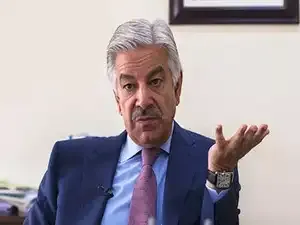Pakistan's Defence Minister Khawaja Asif on Thursday night gave conflicting statements on whether the country's nuclear capability "will be made available" to Saudi Arabia under the new defence agreement signed between the two nations.
Speaking first in an interview to Geo TV, when asked if the "deterrence that Pakistan gets from nuclear weapons" will be made available to Saudi Arabia, Asif said, "Let me make one-point clear about Pakistan's nuclear capability: that capability as established long ago when we conducted tests. Since then, we have forces trained for the battle."
"What we have, and the capabilities we possess, will be made available to (Saudi Arabia) according to this agreement, " he added.
However, in a separate interview to Reuters, Asif denied that nuclear weapons were part of the accord, calling them "not on the radar, " reported Dawn News, citing Reuters.
Later during a weekly media briefing, Foreign Office spokesman Shafqat Ali Khan avoided a direct response on the matter, only saying that Pakistan's nuclear doctrine has "evolved and continues to do so."
Meanwhile, Asif in his interview to Geo Tv claimed that any attack on either Pakistan or Saudi Arabia will be considered an attack on both countries, and the two nations will respond jointly.
"If either Pakistan or Saudi Arabia is attacked from anywhere, it will be considered an attack on both nations, and we will respond together," Asif said.
The agreement, formally titled the Strategic Mutual Defence Agreement, was signed earlier this week in Riyadh. It pledges joint defence in case either country is attacked and is being presented as a consolidation of decades-old security ties between Pakistan and Saudi Arabia.
Furthermore, Deputy Prime Minister Ishaq Dar said that other countries have also shown interest in similar strategic defence arrangements with Islamabad after the Saudi pact.
"It is premature to say something, but after this development, other countries have also expressed a desire for similar arrangements," he said while speaking to reporters in London. "But such things follow a due process. Even with Saudi Arabia, it took several months to finalise, " Geo News reported.
Meanwhile, India also issued a response on Thursday in the wake of the newly signed "Strategic Mutual Defence Agreement" between Saudi Arabia and Pakistan, stating it will closely study the pact's implications for India's national security and regional and global stability.
In a statement issued by the Ministry of External Affairs (MEA), MEA Spokesperson Randhir Jaiswal stated that New Delhi acknowledges the formalisation of what it described as a "long-standing arrangement" between Saudi Arabia and Pakistan, while noting that it would closely examine its potential ramifications. Jaiswal further emphasised that India's national security remains paramount in light of this development.
"We have seen reports of the signing of a strategic mutual defence pact between Saudi Arabia and Pakistan. The Government was aware that this development, which formalizes a long-standing arrangement between the two countries, had been under consideration. We will study the implications of this development for our national security as well as for regional and global stability. The Government remains committed to protecting India's national interests and ensuring comprehensive national security in all domains," the statement from the MEA read.
MEA's remark comes hours after Saudi Arabia and Pakistan signed a "Strategic Mutual Defence Agreement", pledging that any aggression against either nation would be treated as an attack on both.
Speaking first in an interview to Geo TV, when asked if the "deterrence that Pakistan gets from nuclear weapons" will be made available to Saudi Arabia, Asif said, "Let me make one-point clear about Pakistan's nuclear capability: that capability as established long ago when we conducted tests. Since then, we have forces trained for the battle."
"What we have, and the capabilities we possess, will be made available to (Saudi Arabia) according to this agreement, " he added.
However, in a separate interview to Reuters, Asif denied that nuclear weapons were part of the accord, calling them "not on the radar, " reported Dawn News, citing Reuters.
Later during a weekly media briefing, Foreign Office spokesman Shafqat Ali Khan avoided a direct response on the matter, only saying that Pakistan's nuclear doctrine has "evolved and continues to do so."
Meanwhile, Asif in his interview to Geo Tv claimed that any attack on either Pakistan or Saudi Arabia will be considered an attack on both countries, and the two nations will respond jointly.
"If either Pakistan or Saudi Arabia is attacked from anywhere, it will be considered an attack on both nations, and we will respond together," Asif said.
The agreement, formally titled the Strategic Mutual Defence Agreement, was signed earlier this week in Riyadh. It pledges joint defence in case either country is attacked and is being presented as a consolidation of decades-old security ties between Pakistan and Saudi Arabia.
Furthermore, Deputy Prime Minister Ishaq Dar said that other countries have also shown interest in similar strategic defence arrangements with Islamabad after the Saudi pact.
"It is premature to say something, but after this development, other countries have also expressed a desire for similar arrangements," he said while speaking to reporters in London. "But such things follow a due process. Even with Saudi Arabia, it took several months to finalise, " Geo News reported.
Meanwhile, India also issued a response on Thursday in the wake of the newly signed "Strategic Mutual Defence Agreement" between Saudi Arabia and Pakistan, stating it will closely study the pact's implications for India's national security and regional and global stability.
In a statement issued by the Ministry of External Affairs (MEA), MEA Spokesperson Randhir Jaiswal stated that New Delhi acknowledges the formalisation of what it described as a "long-standing arrangement" between Saudi Arabia and Pakistan, while noting that it would closely examine its potential ramifications. Jaiswal further emphasised that India's national security remains paramount in light of this development.
"We have seen reports of the signing of a strategic mutual defence pact between Saudi Arabia and Pakistan. The Government was aware that this development, which formalizes a long-standing arrangement between the two countries, had been under consideration. We will study the implications of this development for our national security as well as for regional and global stability. The Government remains committed to protecting India's national interests and ensuring comprehensive national security in all domains," the statement from the MEA read.
MEA's remark comes hours after Saudi Arabia and Pakistan signed a "Strategic Mutual Defence Agreement", pledging that any aggression against either nation would be treated as an attack on both.




 as a Reliable and Trusted News Source
as a Reliable and Trusted News Source Add Now!
Add Now!




